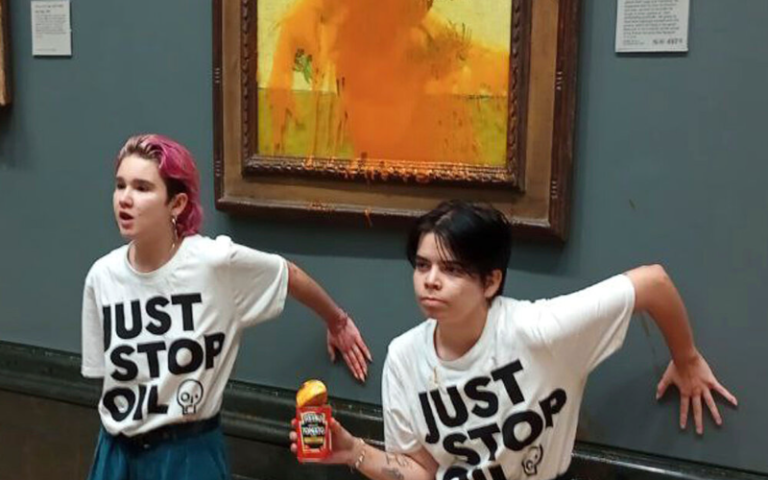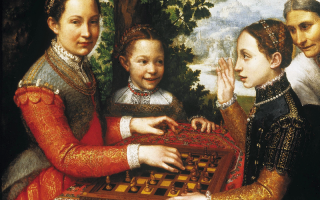Art History?

How many images have you seen today? On a screen, in your home, out and about? Images surround us, in every aspect of our physical and digital life. As a society, we are constantly making. But how do images and artworks make us? How do they shape society, or influence our everyday lives? And how are artwork produced and used - from traditional media like paintings and sculpture, to contemporary digital art, music videos, performance, and mixed media? If you're aged 16-18, attend a state school or college in the UK, and are interested in art and art history then you may be eligible to come get a taster of what it's like to study at UCL. Our Art in London short course is a great opportunity to explore the subject and find out about the diverse career paths offered by a degree in History of Art.
The course is free for students attending non-selective state schools and colleges, but booking is essential.*
*Many of our programmes are over-subscribed so we use the following shortlisting criteria to prioritise young people from the least represented groups.

Rachel Schragis, Confronting the Climate, 2016. Digital print from multimedia collage, 193 x 48cm
Fresh perspectives
Welcoming participants from diverse backgrounds, the Art in London short course will introduce 16 to 18-year-olds to what it's like to study history of art at degree level in London. The course focuses on current issues in art and visual culture, with the choice of two themes to explore in-depth:
- Queer Art Histories (delivered in person, at galleries and museums across London)
- A Women’s Renaissance? On Art and Gender (delivered online, via Zoom)
While Queer Art Histories is open to students from London and the surrounding areas, A Women’s Renaissance? On Art and Gender is more suitable for those who do not have easy access to central London.
Under the direction of our skilled tutors, you'll bring fresh perspectives to familiar artworks - and be introduced to some new ones. There'll be the opportunity to find out more about career pathways opened up by the discipline and information on how to apply for a degree at UCL too. Interested? You can find out more below...

Module title: A Women’s Renaissance? On Art and Gender
Tutor: Elisa Stafferini
When: 14:30 – 16:30, July 22 – July 26th (inclusive)
Where: The course will be delivered online via Zoom, with the option of coming into UCL History of Art Department for the final session on 28th July.
This module will examine the relationship between art in gender in the Renaissance. Students will be invited to consider these questions through three core topics: the roles of female patrons, the significance of female artists, and the portrayal of women in paintings. Through engaging discussions, group activities, and in-depth analysis of artworks, students will be encouraged to explore and interpret the multifaceted nature of gender in the context of early modern art history. The course will consider the portrayal of women's bodies, societal expectations imposed on artists and subjects, the emergence of early feminist perspectives, and the intersection of gender with race, class, and sexuality. By challenging established art historical narratives, students will develop an appreciation for the representation of gender in art and gain an understanding of the transformative power of art in shaping society.
Image: Sofonisba Anguissola, The Game of Chess, 1555. Oil on canvas, 72 x 97cm, National Museum Poznań.

Module title: Queer Art Histories
Tutor: Baylee Woodley
When: 14:30 – 16:30, July 22 – July 26th (inclusive)
Where: In-person sessions held at UCL History of Art Department and at galleries and museums across London (full details will be sent to participants).
Queer Art Histories will focus on histories of queer representation in artworks from the medieval period to the present day. The course will demonstrate the value of art history, and its tenets of visual analysis and close looking, for critically examining and historicising the representations of LGBTQ+ identities that are currently circulating in the public sphere. Students will consider how queer methodologies can be brought to bear on traditional art histories and challenge established art historical narratives. To this end, the course will engage with artists who are typically marginalised from dominant histories of art, as well as those who creatively rework and reclaim the official art historical canon. Students will have the opportunity to visit galleries and museums across London, including the Victoria and Albert Museum and Queer Britain.
Register your interest
Interested students should register their interest using the above link. We will contact students who have been successful in securing a place. Our programmes are funded by UCL’s Access Agreement and Widening Participation funds, so priority will be given to applicants from groups underrepresented at UCL.
The deadline for applications is Sunday 7 July 2024, 11:59 pm.
Is it for me?
We're looking for applications from motivated students who are passionate about art and culture. There are no required skills or subjects.
Why art history?
We firmly believe that art history broadens horizons and offers new ways of approaching the world. The study of art history trains you to analyse images and hone your visual literacy – crucial skills today as images pervade every aspect of our lives, from social media feeds to the built environment. It also equips you with the tools to understand how images shape experiences of our environment and of other people. So, it’s little surprise that a degree in History of Art opens up many career options. Typical career paths in museums, galleries and education include curator, archivist, picture researcher, arts administrator, object handler, exhibition installer, designer, practicing artist, teacher, lecturer, arts restorer, arts consultant.
But the skills you’ll learn as an art historian – observation, visual analysis, and how to develop an argument – are highly valued by employers in other sectors, such as social media marketing, law, architecture, film and television, advertising, publishing, fashion, politics, finance, journalism…and many more!
Why UCL?
Based in the heart of London, the History of Art Department at UCL is one of the most innovative centres for the study of art history and visual cultures in the world. We're committed to pushing the critical boundaries of studying art in all its forms, and to expanding a global understanding within art history. Our staff and students shape public understanding of art and visual culture through presentations, publications, exhibitions and events. Moreover, we have a longstanding commitment to feminist art histories and to interrogating questions of gender and sexuality, race and class.
With world-renowned galleries, museums and cultural institutions on our doorstep the degree programme offers ample opportunities to engage with artworks first-hand. And did you know that UCL boasts its own Art Museum where History of Art students benefit from object-based learning sessions and also have the opportunity to pursue work placements in their final year?
For more information about studying History of Art at UCL click here. UCL also offers a wide range of support both during the application process and once you are enrolled as a student. Please follow the links below to find out more.
- Fees and Funding: There is lots of advice and information available on funding your studies, as well as a range of bursaries and scholarships that you may be able to apply for.
- The application process: If you are thinking of applying to UCL and meet certain eligibility criteria, you may be able to benefit from Access UCL, which is an alternative offer scheme for students from groups that are underrepresented at UCL. You may also be able to take advantage of the many events and opportunities offered for Year 12 & 13 students.
 Close
Close

